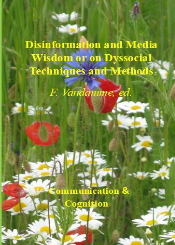|
Disinformation and media wisdom or
on dyssocial techniques and methods Vandamme F., De Brauwer A., Fu Zhi, Balder M., Muylle F., Wang L. Blue Lotus Series, No. 1, 2022 Fernand Vandamme Communication & Cognition ISBN 9789079921133  DOI https://doi.org/10.57028/BN-222-133-Z1018 |
|
Introduction
When we talk or think about media and especially about media wisdom, then we are thinking about influencing and stimulating individuals and groups of people. Influence them to amuse them, to dream about their future: their personal, familial, cultural, ecological perspectives, to stimulate them to get more well-being… This means one appeals to all possible skills of people: their communicative, their cognitive, their social skills, their skills for creating and enjoying amusement…
Still through the media, one is not only able to target, to stimulate all possible skills… As much one is trying and in fact one is able to block the use and development of skills. Through the media one tries and sometimes very successfully (for instance in situations of real or metaphorical warfare) to thwart the communicative, cognitive, social actions and interventions of the readers, listeners, participants in the media.
Contents
Apostel, L., 1979. Studies in action theorie logique et dialectique. Gent, Communication & Cognition.
Arnauld, A. & François Hallier, F., 1644. Théologie morale des Jésuites, extraite fidèlement de leurs livres contre la morale Chrétienne.
Bloom, P., 2020. Trends in Cognitive Sciences.
Bondarenko, D. M., Grinin, L. E. & Korotayev, A. V., 2002. “Alternative Pathways of Social Evolution”. Social Evolution & History. Vol. 3 (1), pp. 54‑79.
Bondarenko, D. M., 2006. Homoarchy: A Principle of Culture’s Organization. The 13th – 19th Centuries Benin Kingdom as a Non-State Supercomplex Society. Moscow: KomKniga/Editorial URSS.
Brems, P., 2020. In het hoofd van de pestkop: waarom kinderen elkaar pesten en wat we daaraan kunnen doen. VRT NWS 20/02/20.
Chomsky, N., 2014. On Anarchism. Penguin books
Chomsky, N., 2014. Language and freedom. In: On Anarchism.
Crombez, B. 2020a. Lean transformaties leiden. Waarom “lean” werkt en hoe het succesvol introduceren, Gent.
Crombez, B., 2020b. “Making big progress with small steps: using lean methods to create a culture of learning”. Communication & Cognition, Vol. 53, (1-2), pp. 33-47.
De Borger, A., 2022. Mensen beseffen pas achteraf dat ze zijn gemanipuleerd, HLN p. 63, 12 maart 2022.
De Cock, L., 2022. Blijf van mijn lijf. Antwerpen: Maklu.
Delbeke, F., 1927. L’action politique et sociale des avocats au XVIII siècle. Librairie Universitaire Louvain.
Dumas, F.R.,1963, Grandeur et misère des Jésuites. Les productions de Paris, p.330.
Fisher, R., 2020. There’s a dark side to feeling the emotions of other people. In some cases, it can even lead to cruelty, aggression and distress. 2nd October.
Gastmans, C. & Vanlaere, L., 2005. Cirkels van zorg. Ethisch omgaan met ouderen. Baarn: Ten Have, Leuven: Davidsfonds.
Gastmans, C. & Dierickx, K., 2002. Ethiek in witte jas. Zorgzaam omgaan met het leven. Leuven: Davidsfonds.
Girard, R., 1972, La violence et le Sacré, Edition Grasset.
Gnostotheca I, 2022. Gent: Communication & Cognition.
Gnostotheca VI, 2021. Gent: Communication & Cognition.
Hall, J., 2020. Scientific American, 9/2020.
Harari, Y. N. 2020, Sapiens, Thomas Rap, Amsterdam.
Harari, Y. N., 2014. From animals into Gods. A brief history of human kind. London: Harvill Secker.
Hintikka, J. & Vandamme, F., 1985. Logic of discovery and logic of discourse. New York & London: Plenum Press, Gent: Communication & Cognition.
Inana, G., 2007. Holistische wijsheid in 366 dagen. Gent: Communication & Cognition.
Inana, G., 2008. Keltische wijsheid. Gent: Communication & Cognition (C&C).
Kaczmarski, P., Albiñana, D., Vandamme, F. & Wang, L., 2012. “Educative framework for higher computer education”. Scientia Paedagogica Experimentalis, Vol. XLIX, (1-2), pp. 83-114.
Kaczmarski, P. & Wang, L., 2011. “A learning thesaurus an excerpt”. Scientia Paedagogica Experimentalis, Vol. XLVIII, (1-2), pp. 29 102.
Kaczmarski, P. & Vandamme, F., 2005. Content Management Tools in a Knowledge Management Perspective. Gent: Gent: Communication & Cognition.
Kaczmarski, P., Porta, M., Çiço, B., Frasheri, N., Cantoni, V, Wang, L. & Vandamme, F., 2018. “Designing a strategic framework for european computing education and training”. Scientia Paedagogica Experimentalis, Vol. LV (2), pp. 101-136.
Longrich, N. R., 2020. 3rd November, BBC. Https://www.bbc.com/future/article/20201102-did-neanderthals-go-to-war-with-our-ancestors
Mostar, H., 1956. Beroemde gevallen van gerechtelijke dwaling. Antwerpen: Spectrum.
Moulin, 1632. Catalogue des traditions Romanes.
Mandelbrot, B., 1985. The fractal geometry of nature. Macmillan.
Mandelbrot, B., 2004. Fractals and Chaos, Berlin: Springer.
Muylle, F. et al., 2021. “From care to educational, social, cultural challenges”. Scientia Paedagogica Experimentalis, Vol. LVIII, (1), pp. 63-74.
Muylle, I. & Balder, M., 2018. “Hominisation versus Harmonisation”. Communication & Cognition, Vol. 51, (1-2), pp. 43-51.
Muylle, F. & Vandamme, F., 2017. A Post-Genetic-Cultural human perspective on Terrorism versus Harmony. A cognitive and communicative view. Communication & Cognition, Vol. 50, (1-2), pp. 49-62.
Muylle, F., 2017. Information war with Micro and Macro Thesauri. Lotuswebtec.com/en
Ovide, 0008CE, 1966. Les Métamorphoses. Paris: Flammarion.
Pascal, B., 1670, Pensées. Bibliothèque Lattès (ed. 1988).
Pascal, B., 1656-1657. Les Provinciales. Nouvel Office d’Edition (ed.1964).
Price, N. 2021. The Vikings, Taylor & Francis Ltd.
Rousseaux, M. et al., 2013. Het Leeractieteam Cupie-Do, Leermoeheid in een holistisch perspectief. Gent: Communication & Cognition.
Vandamme, F, et al., 2022. Disinformation, Critical Thinking and Dyssocial Techniques and Methods, Communication & Cognition, 55, 1/2, 49-114.
Vandamme, F., 2021. Naar een Post Genetische, Culturele mens. Gent: Communication & Cognition.
|


